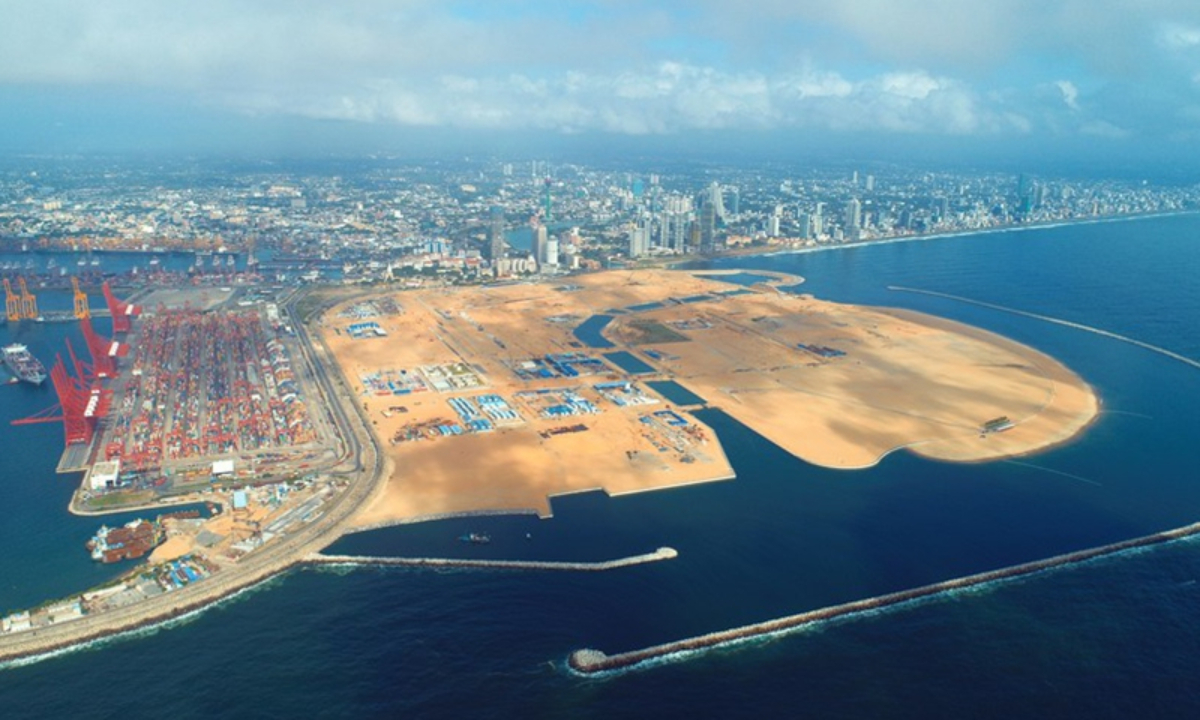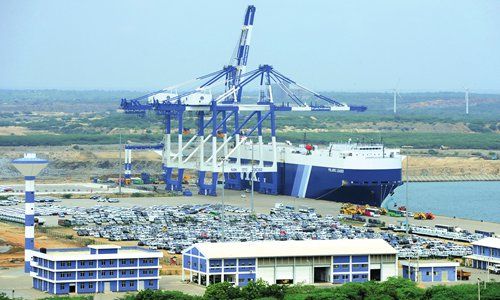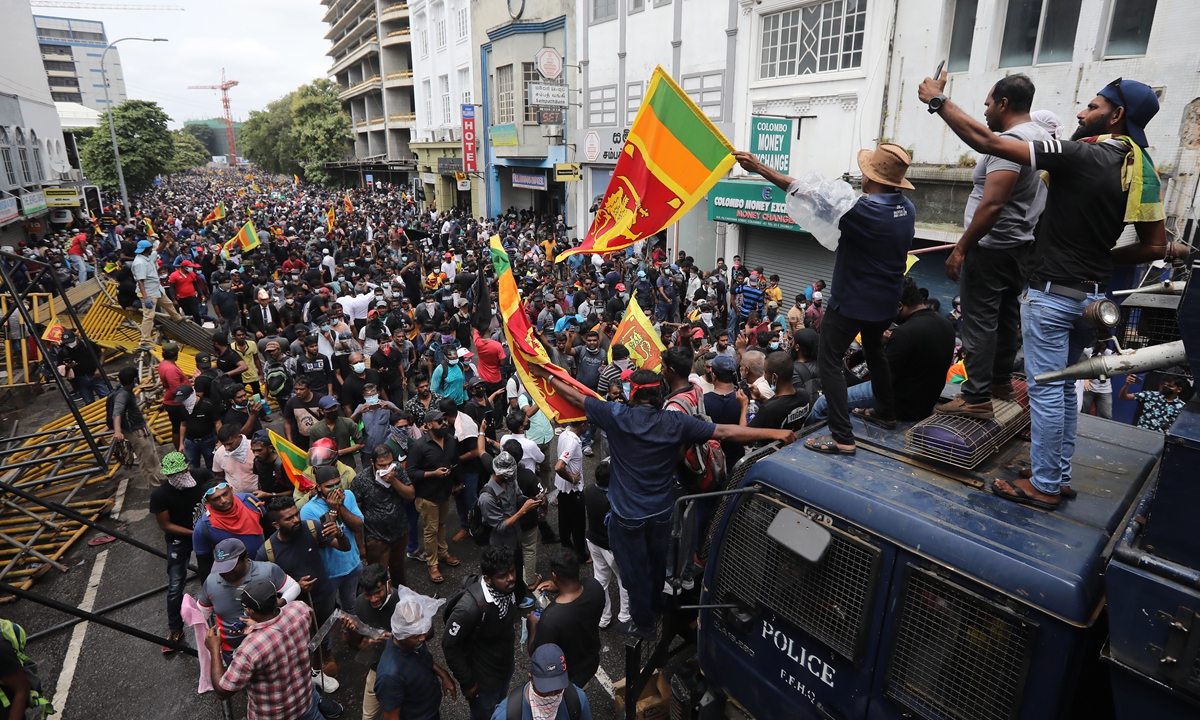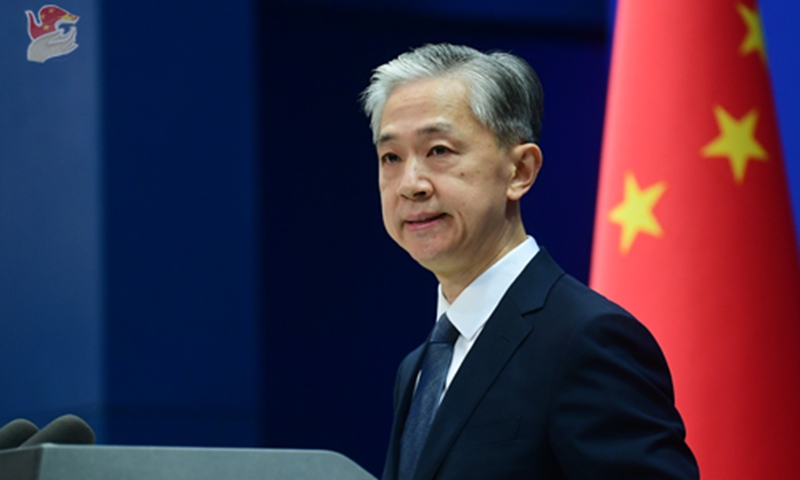Operation of Sri Lanka's Hambantota Port critical for economic revival: operator
China to assist Sri Lanka to best of its ability: officials

A view of the construction site of the Colombo Port City in Colombo, Sri Lanka Photo: Xinhua
China will provide assistance to the best of its ability to Sri Lanka and work with relevant countries and international financial institutions in addressing its difficulties and debt burden, Chinese officials said on Thursday, as the South Asian nation became further mired in an economic crisis over the past week.
Meanwhile, the second batch of emergency humanitarian grain aid - 1,000 tons of rice - from China was handed over to Sri Lanka on Thursday, according to the Chinese Embassy in Sri Lanka.

The second batch of emergency humanitarian grain aid - 1,000 tons of rice - from China was handed over to Sri Lanka on July 14, 2022. Photo: the Chinese Embassy in Sri Lanka
As part of China's 500 million-yuan ($73.9 million) emergency humanitarian aid to Sri Lanka announced earlier, the first two shipments of Chinese rice, totaling 2,000 tons, arrived at the port of Colombo on June 28 and July 8, respectively.
Observers are calling for global efforts for an immediate debt restructuring plan to help the country get through the difficulties, while cautioning that Sri Lanka should ensure the operation of major transport projects such as the Hambantota Port, which could be critical for its revival.
In a sign of close attention China pays to the situation in Sri Lanka, both the Chinese Ministry of Commerce (MOFCOM) and the Foreign Ministry commented on the situation in the South Asian country on Thursday.
"For the difficulties faced by Sri Lanka, China will continue to provide assistance to the best of its ability and support Sri Lanka's early recovery of the economy and improvement of people's livelihoods," Shu Jueting, a spokesperson of the MOFCOM, told a regular press conference on Thursday.
Foreign Ministry spokesperson Wang Wenbin also said during a press briefing on Thursday that China is willing to work with relevant countries and international financial institutions to continue to play a positive role in helping Sri Lanka cope with the difficulties, alleviate the debt burden and achieve sustainable development.
Amid turmoil caused by the debt crisis, Sri Lanka's Prime Minister Ranil Wickremesinghe declared a state of emergency on Wednesday. Local police have imposed a curfew in the Western Province, including the capital Colombo, the Xinhua News Agency reported.
The situation has sparked global concerns about the future of the country's 22 million people, with some struggling to buy basic goods and fuel.
Among many other types of humanitarian aid, China has been talking about restructuring plans with Sri Lanka, and an important issue is to rearrange the debt payments as they fall due, Zhou Rong, a senior researcher at the Chongyang Institute for Financial Studies of Renmin University of China, told the Global Times on Thursday.
"The most important thing is for all stakeholders, including international organizations and countries, to negotiate debt restructuring plans, and revise and postpone payment dates, in an effort to solve the most urgent problem for the country," Zhou said. "But everyone needs to realize that it cannot pay back loans, at least for the moment, since it is running out of foreign exchange and needs time to recover."
According to the External Resources Department of Sri Lanka, in 2019, by far the largest proportion of debt, almost 50 percent, was owed to international sovereign bond holders, mainly US-based funds and banks.
Japan and China each held 10 percent and India held 2 percent of Sri Lankan debt. The remaining part was owed to others, including multilateral banks such as the Asian Development Bank and World Bank.
Analysts pointed out that China's loans to the country are mainly long-term ones with a range of 15-20 years and preferential rates.
Moreover, industry watchers pointed out that Sri Lanka should better ensure the operation of key projects such as the China-operated ports, which not only support the movement of international trade, but can also inject economic momentum and play a key role in helping the country attract foreign investment at a later time.

A view of the port facility at Hambantota port File photo: VCG
China Merchants Port Holdings, which operates Hambantota Port, said in a statement it sent to the Global Times that Sri Lanka does face some challenges at the moment, such as a shortage of electricity and diesel supplies, but the Sri Lankan government has listed the port as an "essential service," so the port still has critical supplies.
Brushing off headwinds, the port recorded increased throughput in the first five months of the year. Container throughput of China Merchants Port Holdings Co-managed Colombo International Container Terminal increased by 5.2 percent year-on-year, and the port's bulk and general cargo throughput increased by 1.5 percent year-on-year, according to the firm.
"What we need to point out is that Sri Lanka is a country under the rule of law, and protecting the interests of foreign investors is also the country's consistent proposition. It should be able to safeguard the investment interests of China Merchants Port in Sri Lanka. We will also review developments from time to time and take necessary measures to mitigate risks when necessary," said the company.



